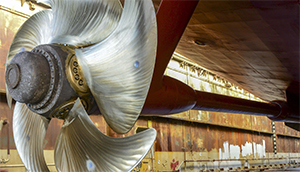A study conducted to better understand the impact of environmentally acceptable lubricants (EALs) on stern tube bearings did not find definitive evidence that they were responsible for recently reported increases in bearing failures.
The American Bureau of Shipping (ABS) completed a joint study earlier this year with United Kingdom-based Vickers Oils and the Tribology Group at Imperial College London to gauge the effect of EALs on stern tube bearings (STBs). The project focused on comparing and quantifying the lubricating performance of EALs and mineral oils.
The study evaluated fundamental oil and lubricant properties when EALs and mineral oils were placed under journal bearing tests, mimicking conditions expected in actual STB applications.
“Overall, the study did not conclude that EALs were responsible for the reported STB failures, or that if mineral oils were used the failures could have been prevented,” said Marios Ioannou, ABS principal engineer. “More specifically, the study identified key properties of EALs that are worth considering during the EAL selection process.”
Ioannou said the project results demonstrated that when a journal bearing operates normally — for example, with no misalignment — the primary lubricant property that affects oil performance is viscosity.
Viscosity is the oil’s resistance to flow. Ideally the lubricant should be thin enough to flow smoothly, but thick enough to provide an adequate layer of protection. The journal bearing tests showed that mineral oils and EALs behaved similarly concerning lubricant forming ability and wear prevention.
However, the study did identify several differences between EALs and mineral oils that may influence STB operation. Lubricants tend to thin when they heat, then thicken when they cool. The study found that the viscosity of EALs was more stable with respect to changes in temperature. That means there was less thinning and thickening, which is vital in STB applications that involve temperature variations. However, when comparing lubricants with the same viscosity rating, once the temperature dropped below 40 degrees Celsius (104 degrees Fahrenheit), mineral oils had a higher viscosity — meaning they were thicker and potentially provided more protection.
The study also found that high-pressure increases may cause EALs to form thinner films than mineral oils, resulting in less protection for the bearing surfaces. Because high-pressure increases can occur due to incorrect shaft alignment, ABS recommends ensuring proper alignment in STB installations when using EALs. That is not to say that under the same conditions mineral oils will prevent failure, but that they may offer an increased margin of safety.
The study partners said the findings will help shipowners and operators choose the correct oil, and also provide lubricant manufacturers with information needed to develop better-performing EALs.
“By tackling this issue together with ABS and Imperial College London, we were able to develop a deeper understanding of lubricant behavior in a journal bearing, operating both normally and under edge loading conditions, which will help us to give the best advice to owners and operators wishing to reduce the adverse effects of shaft misalignment, and inform our product development process,” said Chris Wholley, technical director for Vickers Oils.

